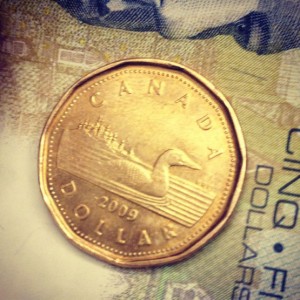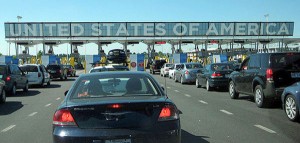The lame “Loonie” and cross-border buying

The Loonie: In Canada it’s worth a dollar. In the US, it’s worth about 69 cents. Photo: Aaron Strout, Creative Commons, some rights reserved
That Loonie keeps diving lower, but unlike that bird with the haunting call heard across lakes in summer, the Canadian dollar (aka the Loonie because of the loon on the $1 coin) isn’t trying to catch a fish—it’s being forced down in value because of economic waters where cheap oil has spilled.
Lately, the Canadian dollar has been trading as low as $.69 U.S. The diving dollar in Canada is the result of an oversupply in oil, something Canada’s economy has been far too reliant upon for the past decade at the cost of our once strong manufacturing sector. Crude oil is trading at just under $30 U.S. a barrel. OPEC, the international oil trading cartel (that Canada is not a member of) is showing no sign of letting the price go up anytime soon.

The limping Loonie means less of this. The border crossing at Champlain, N.Y. Photo: Bobby Hidy, Creative Commons, some rights reserved
The limping Loonie has threatened a popular leisure activity for many Canadians—shopping in the United States. Buying U.S. money with Canadian money is simply starting to cost too much. When our dollar was worth anywhere from $.80 to $1.05 U.S. for nearly the past decade, buying everything from groceries to cars in the U.S. was popular among Canadians. I’m even typing this story on a computer I got a great deal on in Buffalo. My vacuum cleaner came from a large home improvement store in Massena.
Such bargains for Canadian consumers are much less likely to be had now. And of course the situation does not make it easy for the retired “snowbird” Canadians who spend their winters in Florida or Arizona. In the produce section of Canadian supermarkets, Florida oranges and California grapes are going to cost more because importing them is getting more expensive, and despite climate change, we aren’t going to be growing navel oranges or Thompson seedless grapes in Canada anytime soon.

The historic Chateau Laurier Hotel in downtown Ottawa. American visitors and their valuable dollars are always welcome. Photo: James Morgan
However, there’s an upside to all of this for Americans, who have the advantage right now. You can head over here to shop and vacation cheaply. Come and check out Ottawa’s cultural attractions and go skating on the Rideau Canal (if it ever opens). Hit the slopes at one of the ski hills just minutes from the city, or shuffle along groomed cross-country trails. We have great restaurants, hotels and bed and breakfasts, too. There are even restaurants in Ottawa that give discounts to NCPR Member Card holders.
I’m not sure if making special trips to Canada just for grocery shopping or other purchases is worth it though, unless there are things you can get here that are rare or not easy to find in the North Country. I do recall hearing about a certain NCPR morning host who drives to Ottawa to buy Norwegian cheese. And keeping a Scandinavian theme, Ottawa is home to the nearest Ikea, too. Malls and downtown stores in Ottawa-Gatineau do offer some high-fashion options that are only available otherwise in central or southern New York.
However, sales tax is the kicker–a combined federal/provincial addition of 13% in Ontario. In Quebec, the total is 15%. Sales taxes apply to just about everything except groceries in both provinces.
There are still some things I’ll buy in the U.S. regardless of how much it costs. There are products in American supermarkets that are non-existent or hard to find in Canada. These include otherwise insignificant items like paper bathroom cups and baking mixes. Prices and selection on many personal care items in the U.S. are far better than in Canada too. My hair is clean because of American shampoo.
And, I love the products sold at local specialty stores. Friends and relatives were quite pleased with their Christmas gifts that came from the TAUNY Center’s shop in Canton, and I never leave the Brewer Bookstore at St. Lawrence University empty handed. When warm weather returns, I’ll still go camping at state parks in New York and Vermont because the price per night, even with the high exchange rate and higher fees for out of state residents, is still almost half of what it costs in Ontario or Quebec.
The recent surge of Canadians driving to Ogdensburg to buy Powerball lottery tickets is another example of crossing the border to spend money at literally any cost. The over-arching point is that we’re all still going to cross the border to buy things, do business, or visit friends and family no matter how lame our Loonie is.










This is not unusual at all. As recently as 2002 the Canadian dollar was trading at 63 cents vs. the American dollar. It has always been a very volatile entity and I have never not made money exchanging for it when it is low and waiting a few months.
I suspect the fact oil is around $29 a barrel has something to do with this recent drop in Canadian money.